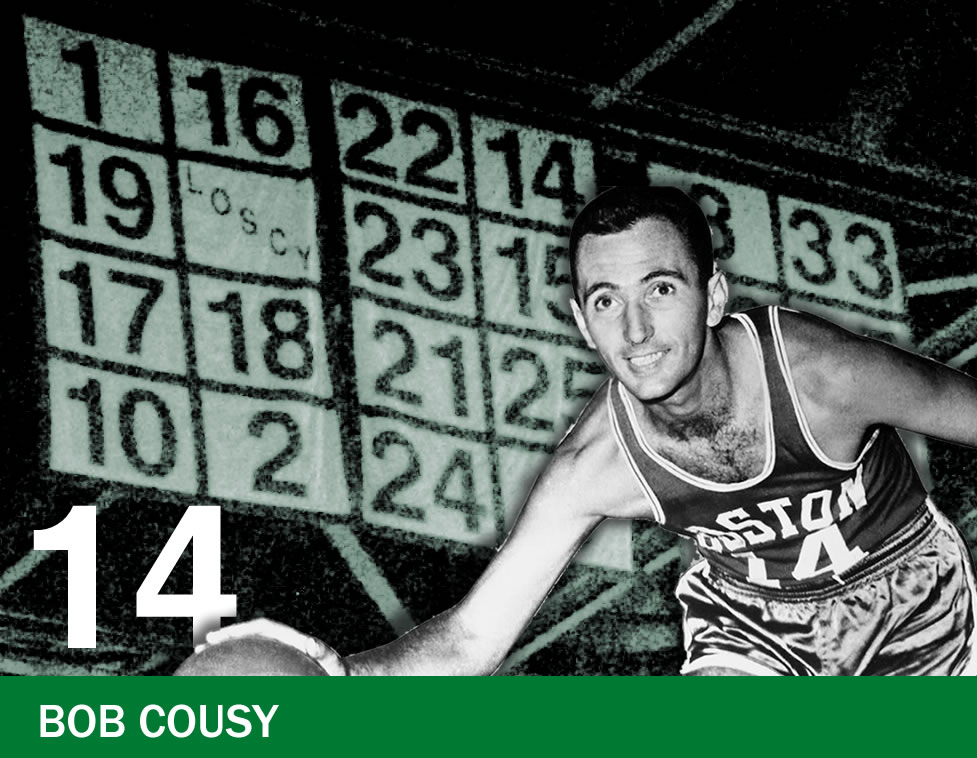From now until February 11, Red’s Army will be posting stories about the players behind the Celtics’ 22 retired numbers and that one retired nickname. Stories will be posted in the order that the numbers were retired.
The two stars of the Celtics’ early years, Ed Macauley and Bob Cousy, had their numbers retired on the same evening, October 26, 1963–the Celtics’ home opener against the Baltimore Bullets.
Easy Ed was traded away in the summer of 1956, along with Cliff Hagen, for Bill Russell.
Cousy was the bridge between the Celtics’ raw early years and their dominance in the late 50s and 60s.
A standout for Holy Cross, Cousy won an NCAA title his freshman year, and was drafted by the Tri-Cities Blackhawks.
The Tri-Cities Blackhawks were a Moline, Illinois outfit (the Tri-Cities–Davenport, Rock Island and Moline–became the Quad-Cities when someone decided that Bettendorf also qualified as a city). In 1950, they were one of the shakiest franchises in the still-wet-behind-the-ears NBA, and Cousy wanted no part of them.
They drafted him, he refused to report, they cut him loose, and the Celtics picked him up. I’m sure Red Auerbach would’ve loved to take credit for that little maneuver, but he flat-out botched it.
With the worst record in the eastern division, the Celtics had first dibs on Cousy.
Auerbach passed on him, picked up a guy named Chuck Share, and proceeded to get lambasted by the Boston press–as quiet then as it is now. Auerbach called Cousy a ‘local yokel’, and there matters would have stood.
Except when Cousy refused to report to the Tri-Cities Blackhawks (you know them best as the Atlanta Hawks, whence they ended up after stops in Milwaukee and St. Louis), the Blackhawks traded him to the Chicago Stags.
The Stags promptly folded, and three of their players were divvied up among the worst three teams in the league (the Warriors, Celtics and Knicks). All three owners picked names out of a hat in a hotel room in New York, and the Celtics ended up with Cousy.
Walter Brown was not amused, and neither was Red.
They didn’t realize what they had.
Over the next decade, Cousy quite literally changed how basketball was played (although to be fair, the shot clock helped)
Seriously. Cousy changed basketball.
Basketball, pre-Cousy, was incredibly static. Granted, they didn’t have to stop the game to fetch the ball out of a peach basket, but when he hit the pros in 1950, less than 20 years had elapsed since the sport eliminated jump balls after each made basket.
Cousy moved with the ball the way no one on the big stage had ever moved before.
He was often accused of showboating and you know what? Some of the time he was showboating. But it wasn’t long before other players realized that being able to dribble behind your back allowed you to switch direction without putting the ball at risk to a face-up defender. No-look passes and behind-the-back passes? They looked amazing–and they inevitably caught the defense watching what was in front of Cousy, not what was going on behind him or off to the side.
With Cousy, good basketball became a show that set the sport apart from football and baseball.
Cousy brought an urban ‘street-ball’ style to the NBA; he wasn’t the first person to do most of his tricks, but he was able to combine them–and execute them under pressure–like no one the game had seen before.
When Cousy retired, Walter Brown said, “the Celtics wouldn’t be here without him.” And if Cousy hadn’t led the way, maybe the whole league wouldn’t be here either. Someone was going to bring that up-tempo style of play from the New York City playgrounds to the NBA, and as it happened, that person was Cousy.
At the end of Cousy’s last regular season game, the team had a little ceremony for him. They gave him a bunch of presents and a chance to thank the fans. During his speech, he ran out of the right words to say and stopped talking.
The Garden–where a crowd had once chanted ‘WE WANT COUSY! WE WANT COUSY!’ during a Holy Cross game–was dead silent.
And then, someone, somewhere, yelled out, “WE LOVE YA, COOZ!” and everything was alright.
The Celtics went on to beat the Lakers in the Finals.
https://www.youtube.com/watch?v=Ygr1xqwEerg
Cousy’s stats at Basketball Reference
The retired numbers project:
Add The Sports Daily to your Google News Feed!
